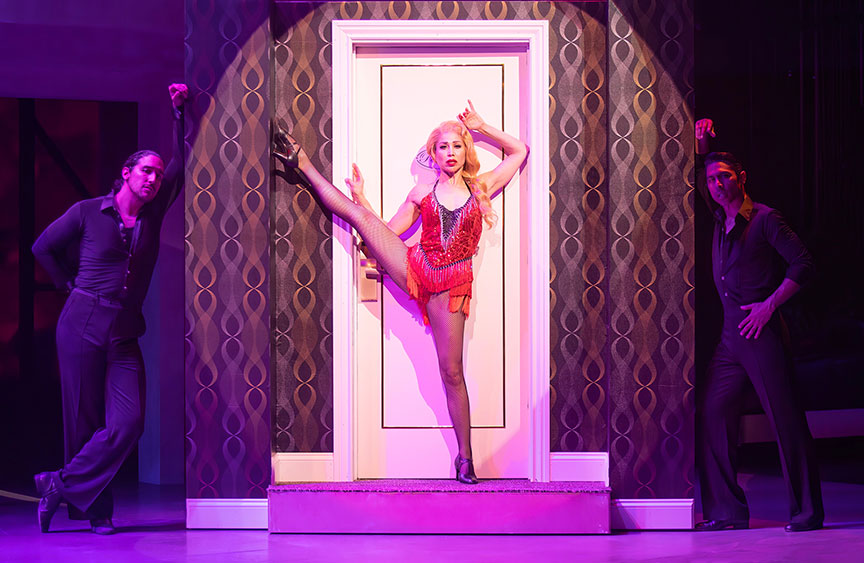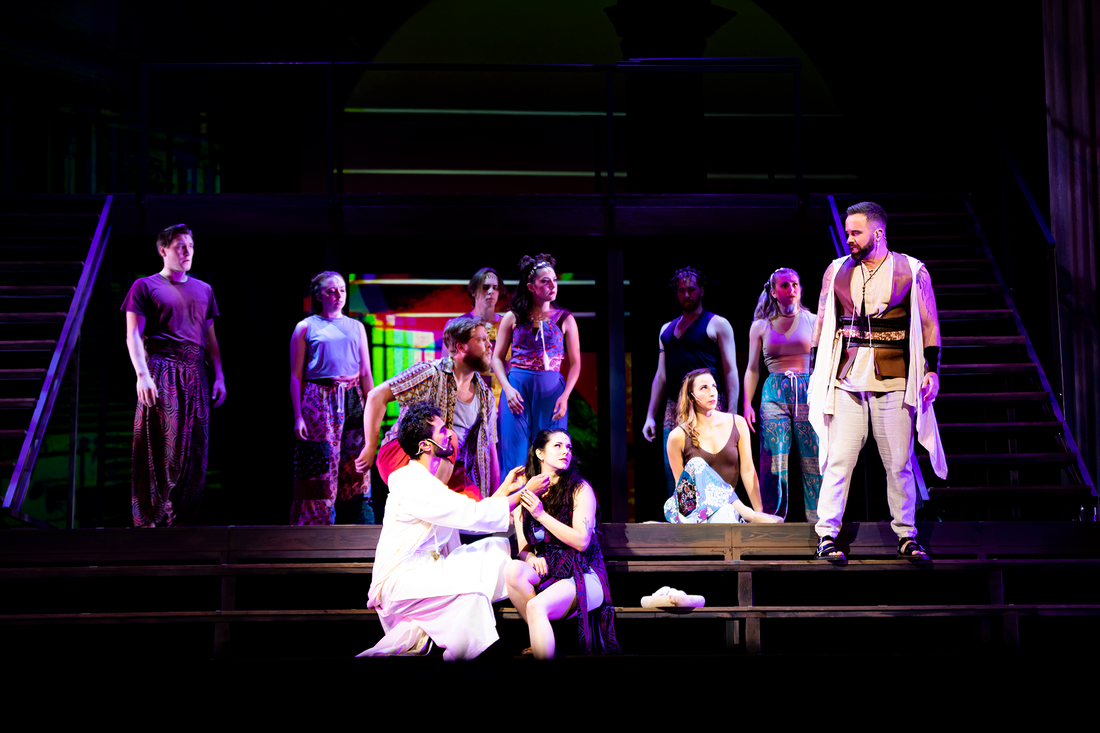|
The scene-stealing Bianca Marroquin in "Destiny of Desire." Photo by Jim Cox Let’s get this understood from the very beginning: NOTHING in “Destiny of Desire” is to be taken seriously. That’s not a trigger warning. Karen Zacarias’ play with music at the Old Globe Theatre isn’t offensive in the least. What it is, however, is a tribute to the anything goes/wildly emotional telenovelas that make American soap operas look like a deadpan episode of “Dragnet” by comparison.
It could be argued that “Destiny of Desire” is as much a spoof of as tribute to the telenovela archetype, and the way the opening night audience at the Globe was howling with laughter and cheers, that’d be a fair point. But Zacarias will tell you she’s not making fun of telenovelas; rather, she’s written one of her own to honor the fact that, as she told me in an interview I did with her for the San Diego Union-Tribune, telenovelas are grounded in real-life situations and people with humanity. The Old Globe, which produced Zacarias’ “Native Gardens” a few years ago in its theater-in-the-round space, is aiming “Destiny of Desire” toward Broadway and as such is giving it the “big show” treatment. It’s staged in the main theater with a slick two-story set by Rachel Hauck, the top of which is occupied by a live band under the direction of Ricky Gonzalez. Costumes, always a Globe asset, are by Karen Perry here, and there’s flawless lighting by Jane Cox. If “Destiny of Desire” has a future on the Great White Way, though, it will mainly be because of its crazy tale with its many exaggerated twists and turns and an array of flawed but irresistible characters guaranteed to play on an audience’s sympathies and emotions. None of Zacarias’ “good” people are 100 percent good, and at least one of her “bad” characters is so shamelessly bad that she no question walks away with the show. That would be Fabiola Castillo, played to the hilt by Bianca Marroquin. In the scheming-baddie tradition of Alexis Carrington or J.R. Ewing, Fabiola arranges for the sick, undersized baby born to her and husband Armando (Al Rodrigo) to be swapped at the hospital for the healthy newborn of a poor couple, Ernesto del Rio (Luis Villabon) and his wife Hortensia (Mandy Gonzalez). As if that’s not enough, Fabiola is playing around with her husband’s grown son, hunky Sebastian (James Olivas). This melodrama all goes down in the fictional Mexican desert town of Bellarica. Naturally the two girls grow up quickly – like within the first 15 minutes of the show – and are 18 year olds living very different if parallel lives. “Destiny of Desire” brings them together in outlandish ways, though if you’re a telenovela fan …. maybe not that outlandish. There are far too many plot deviations and detours to chronicle here. Watching “Destiny of Desire” is like bingeing a telenovela’s entire season accelerated into one magnum episode. If along the way you’re wondering what’s what and who’s who and why’s this, that evidently is intended to be part of the fun. At over two and a half hours in length, that’s more fun that I needed given the material, but that’s because I could see where Zacarias and director Ruben Santiago-Hudson were going with “Destiny of Desire” very early on. Those who become more invested than I in the fate of switched-at-birth girls Pilar (Yesenia Ayala) and Victoria Maria (Emilia Suarez) won’t mind the production’s length one bit. Part of the explanation for the run time is the inclusion of the play’s original songs. They’re fine, but they don’t add anything substantial to the storytelling. Their chief contribution is giving Marroquin more to do, which I certainly applaud, and providing Olivas the opportunity to beefcake it up. It’s hard to visualize an actual telenovela cast being as talented as this one is, though. Besides Marroquin, Ayala and Suarez are delightful as the young women, Rodrigo explodes with machismo as Armando and, as a nun (told you this show had everything), Nancy Ticotin intervenes throughout as snide Sister Sonya. A couple of imaginative touches are inter-scene round cards (like at a boxing match) that foretell what’s to come and intermittent announcements of statistical factoids about American culture, Mexican culture and human nature, some of which are attempts at more serious commentary about societal or political issues. Catch your breath. That’s a helluva lot going on in a single production. “Destiny of Desire” is overloaded, but it is never, ever dull. Like a cracking good telenovela, it sucks you in and you’re a goner. “Destiny of Desire” runs through June 25 at the Old Globe Theatre in Balboa Park.
0 Comments
Richard Bermudez (kneeling), Monika Pena and Brian Justin Crum (far right) in "Jesus Christ Superstar." Photo by Fred Tracey After more than half a century, “Jesus Christ Superstar” is still the finest musical in Andrew Lloyd Webber’s – excuse me, Sir Andrew Lloyd Webber’s – canon. From my personal experience with it, the original London recording that starred Murray Head as Judas Iscariot and Deep Purple’s Ian Gillan as Jesus Christ has never been bettered on stage or screen. But that’s neither here nor there. “JCS” is always an entertaining and thoughtful theatrical piece and, needless to say, its story is timeless.
Moonlight Stage Productions’ “Jesus Christ Superstar” honors Lloyd Webber’s music (and Tim Rice’s lyrics) beautifully, with an orchestra conducted by Lyndon Pugeda and passionate vocalists in both Brian Justin Crum (as Judas) and Richard Bermudez (as Jesus). “JCS” is a totally sung-through musical and while its two best-known songs, “Superstar” and “I Don’t Know How To Love Him,” are the most enthusiastically received by audiences, there are no throwaway tunes in the score. Each song with possibly the exception of the Act 2 “Could We Start Again Please” (written for the Broadway stage debut and not on the original album) dramatically propels the story ahead, that Greatest Story Ever Told. Moonlight’s production directed by Steven Glaudini is from the outset in forward motion, though the choreography by Jimmy Locust is excessive in the first act. Too many disciples looking like balletic commune hippies dancing around on the pretext of being in Christ’s charismatic sphere. The campy “King Herod” ragtime number starring an excusably outrageous Dallas McLaughlin is more justifiable as is a Vegas-ready treatment of the penultimate “Superstar” number. Projections by Blake McCarty don’t seem to add anything significant to the proceedings, though they were worth a try with a show that’s been produced as zillions of times as this one has. Amid the occasional over-production, Moonlight’s staging of Judas’ suicide, the flogging of Jesus and the crucifixion are visually potent and visceral. The crucifixion scene, by the way, includes a device I’ve never seen in my many viewings of “JCS.” See what you think. San Diego-born Crum, who performed at Moonlight in “My One and Only” when he was but 16 years old, is the most impressive member of this large “Superstar” cast. He finds the humanity and the self-torture in Judas Iscariot, a critical component of the show. Rather than just singing his part, Bermudez acts his way through as well. It’s a smart approach considering most of the second act of “JCS” conveys without vocals the suffering and strength of Jesus Christ at the hands of his persecutors. While I didn’t especially connect with Monika Pena’s by-the-book Mary Magdalene, I found Jeffrey Ricca’s percolating Pilate among the best if not the best I’ve seen and heard. “Jesus Christ Superstar” is that rare show at Moonlight that’s over in less than two hours. Also that rare show at Moonlight that doesn’t boast the happily-ever-after ending. Or does it? “Jesus Christ Superstar” runs through May 27 at Moonlight Amphitheatre in Vista. |
AuthorDavid L. Coddon is a Southern California theater critic. Archives
July 2024
Categories |
David Coddon |
|

